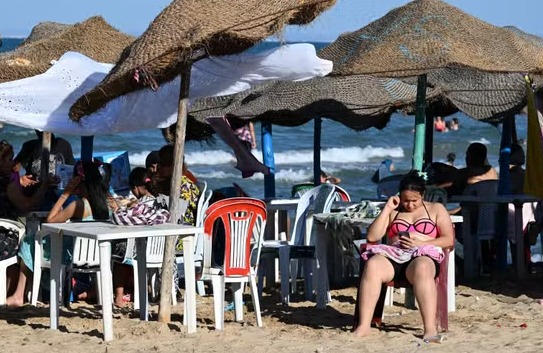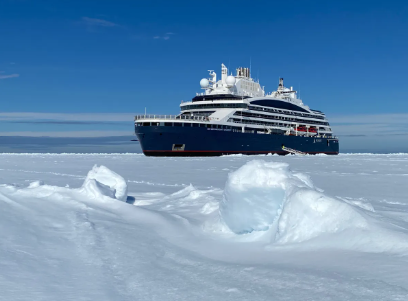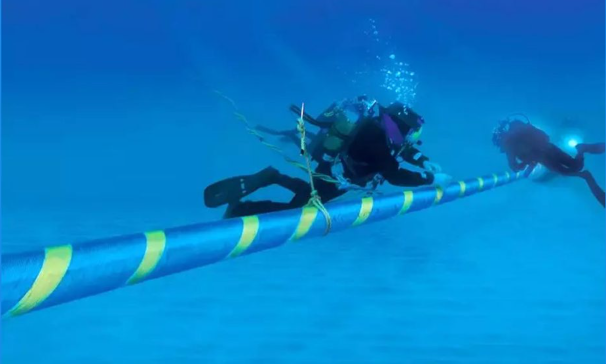Across the country, 28 beaches have been declared unfit for swimming due to industrial pollution and massive discharges of wastewater. One of them is La Goulette, a beach highly popular among residents of Greater Tunis.
It’s 10 a.m. on a weekday at the end of July. So are the summer holidays of Faïza, a 42-year-old secretary at an appliance company and mother of two schoolchildren aged 11 and 14. A resident of Radès, a southern suburb of Tunis, she came by car with her children, her sister Houda, and two nephews to spend part of the day at La Goulette beach, located east of the capital.
Near her home, the water has been unfit for swimming for decades: industrial pollution and untreated sewage have made that part of the coast unsafe. For years, residents of Greater Tunis have been turning instead to beaches further north – especially La Goulette.
Sitting on plastic chairs under a parasol, Faïza and Houda watch the children playing ball by the water. That day, the sea is calm, and a light breeze refreshes the air. What the two women don’t know is that the spot where they’ve settled is now on the official list of 28 beaches banned for swimming. Published at the end of June by the Ministry of Health, the list names beaches declared unfit due to contamination by wastewater and the presence of bacteria such as streptococci or salmonella, which can cause skin infections, respiratory illnesses, or gastrointestinal disorders.
“Every year, it’s more or less the same list, with beaches added or removed without really knowing what measures have been taken to reduce pollution,” laments Sami Mhenni, a marine science engineer and president of the Houtiyat Association, which advocates for marine protection.
Faïza is surprised: no one warned her — not the beach vendor who rented her the parasol and chairs, nor the snack bar worker. At the time the list was published, a large “Swimming Prohibited” banner had been placed at the beach entrance. “We put up several. But it’s true that the one at the entrance was taken down by locals,” says Ali Bourras, head of citizen relations at the La Goulette municipality.
Snack Bars and Parasols Still in Operation
In this bustling neighborhood, seafood restaurants are full on summer evenings, and the sea breeze draws in visitors from more isolated areas. So, local business owners prefer to turn a blind eye. “It’s not this beach that’s banned, it’s the one next to the canal,” insists Mohamed, a waiter at a nearby café.
“We’ve already lost our beaches in Radès and Ezzahra, and now we can’t even swim here?” Faïza exclaims, watching her kids play in the water. “And why maintain the beach if we’re not allowed to use it?” she asks, still in disbelief.
Indeed, snack bars, lifeguard stations, parasols, and beach furniture are all still in place.
“Our role was limited to putting up the signs after the list was published by the Ministry of Health. We can’t do much more,” admits Bourras, who shifts responsibility to the Coastal Protection and Planning Agency (APAL), the public body in charge of beach cleanliness. Previously, permits for using public coastal spaces were issued by municipalities. But since two years ago, APAL has taken over.
“The List Is Outdated,” Claims Health Official
Asked about the risks of swimming at a beach deemed unfit, Samir Ouerghemmi, Director of Environmental Health and Protection at the Ministry of Health, tries to reassure:
“The list is from June — it’s no longer current,” he claims, even though only one version of the list is published each year, with no updates.
“At La Goulette, marine currents lower the risk,” he adds, noting that no serious contamination cases have been reported. According to him, wastewater treatment plants managed by the National Sanitation Office (ONAS) — the main body blamed, alongside industries — are undergoing modernization. But he’s unable to provide details on the progress.
In 2025, 539 beaches were analyzed by the Ministry’s services following WHO standards. However, the official statement doesn’t clarify that only frequented beaches with no immediately visible pollution are tested. Vast stretches of coast with chronic industrial pollution — textile, agro-food, or chemical — in areas like Monastir, Sfax, or Gabès, are not included.
Fish Are Dying
Amid growing public anger over industrial and sewage discharges, particularly in Monastir Bay, President Kaïs Saïed — known for pointing to conspiracies — lashed out during a surprise night visit between July 9 and 10 in the governorates of Nabeul and Monastir, blaming supposed “lobbies” for marine pollution. He also criticized ONAS and APAL, whose inaction, he said, is a “crime against the Tunisian people.”
Sami Mhenni, however, denounces a structural problem that cannot be solved in the short term. He believes that the growth of export-oriented textile and agro-food industries, the multiplication of ports, and population pressure have suffocated the Gulf of Tunis, Monastir Bay, and southern industrial regions like Sfax and Gabès.
Besides its impact on mostly local tourism — hotel zones being relatively spared — the pollution has alarming effects on marine biodiversity and fisheries.
“We need a national program to rehabilitate wastewater treatment plants, a real strategy for water treatment. But nothing concrete is being done. And it’s the small-scale fishermen, already vulnerable, who pay the price,” Mhenni regrets.
In Monastir Bay, the sea has turned pink, the stench is unbearable, and fish are dying. The situation is largely due to textile industry discharges, worsened by climate change, according to several reports from the Tunisian Forum for Economic and Social Rights (FTDES).
“All of this is the result of a savage economic policy that aimed to integrate Tunisia into globalization through textile subcontracting,” says Mounir Hassine, FTDES regional lead in Monastir.
“The state acknowledges the issue but does nothing to solve it, citing a lack of resources. Entire parts of our coastline have been sacrificed to an extractivist model that drains our natural resources for export.”
Back at La Goulette, Faïza has given up hope. The holidays are ending, and it’s almost time to go back to work.
She dreams of one day swimming in Radès, near her home — a beach she’s never enjoyed.




